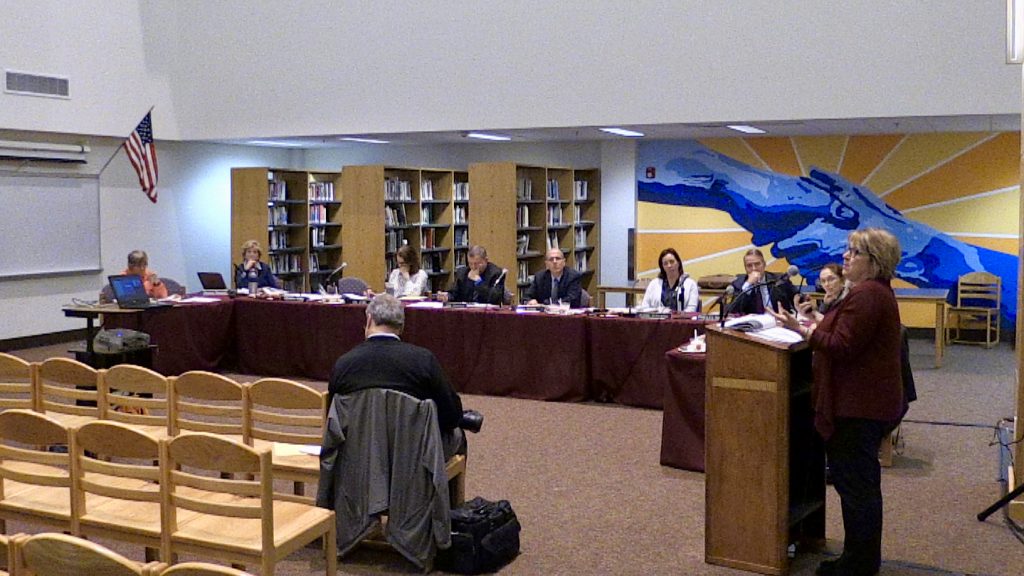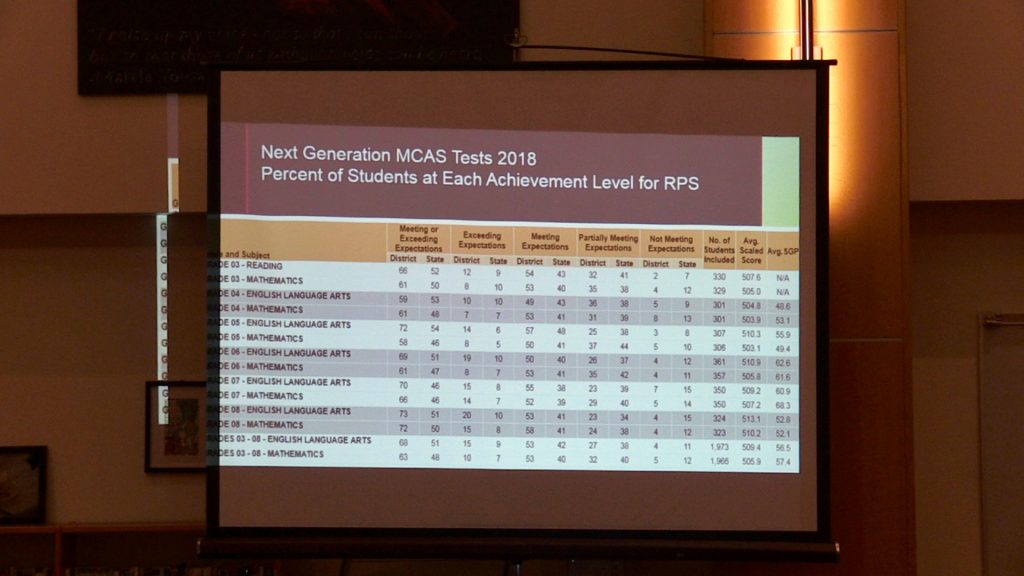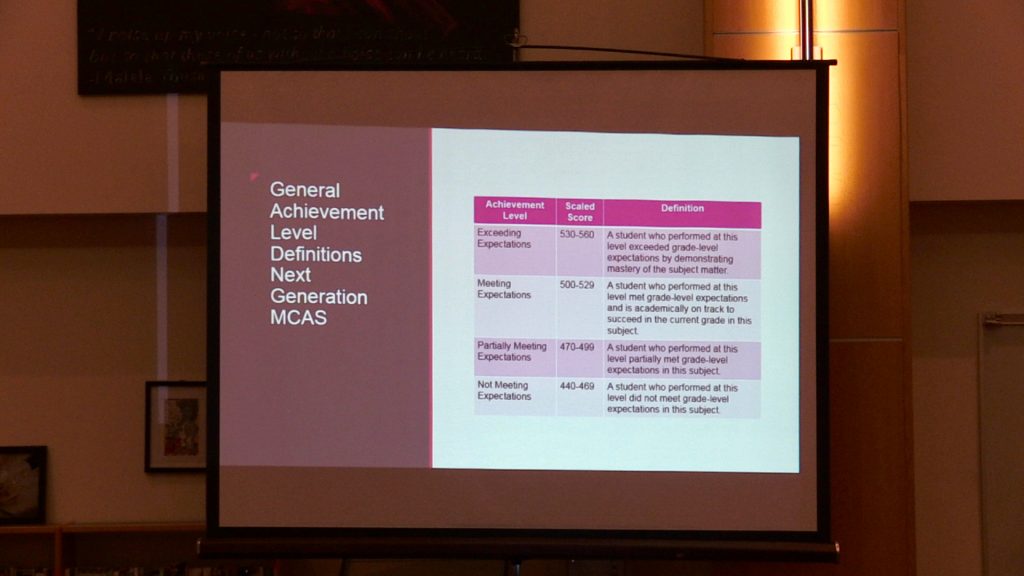 Christine Kelly, Assistant Superintendent for Teaching and Learning for the Reading Public Schools (RPS), presented a broad overview of the RPS spring 2018 MCAS scores to the School Committee on October 18. Kelly began by explaining the way the new computer-based “MCAS 2.0” results are interpreted. The system of accountability is vastly different. Gone is the 1-5 rating system and in its place is a system that measures growth in certain targets for each school on its own measure. New accountability scores now compare school districts and schools only to themselves and not to others. Also, the focus is now on each school’s lowest-performing students, those scoring in the lowest 25 percent. Measured indicators for non-high schools in the district are academics, student growth, growth rates, progress for English language learners, and attendance. Kelly noted that Reading does not have a high enough percentage of English language learners for that indicator to be used for the RPS. Reading Memorial High School (RMHS) was rated on academic achievement, student growth, graduation rate, extended engagement rate, and number of students enrolled in advanced coursework. Kelly believes that the new system is “a more palatable and reasonable system” than the former system because it will cause districts to not focus only on high-achieving students.
Christine Kelly, Assistant Superintendent for Teaching and Learning for the Reading Public Schools (RPS), presented a broad overview of the RPS spring 2018 MCAS scores to the School Committee on October 18. Kelly began by explaining the way the new computer-based “MCAS 2.0” results are interpreted. The system of accountability is vastly different. Gone is the 1-5 rating system and in its place is a system that measures growth in certain targets for each school on its own measure. New accountability scores now compare school districts and schools only to themselves and not to others. Also, the focus is now on each school’s lowest-performing students, those scoring in the lowest 25 percent. Measured indicators for non-high schools in the district are academics, student growth, growth rates, progress for English language learners, and attendance. Kelly noted that Reading does not have a high enough percentage of English language learners for that indicator to be used for the RPS. Reading Memorial High School (RMHS) was rated on academic achievement, student growth, graduation rate, extended engagement rate, and number of students enrolled in advanced coursework. Kelly believes that the new system is “a more palatable and reasonable system” than the former system because it will cause districts to not focus only on high-achieving students.

Christine Kelly – Assistant Superintendent
When presenting Reading’s results, Kelley pointed out several times that the new system is “all about targets” and that RPS was given no guidance as to what those targets were. In fact, the target of advanced coursework for RMHS was not even a consideration for the district. She also reminded the committee that the test is a “snapshot in time, two days in the life of a student.”

Reading’s results were “strong” in grades three, five, six, and eight. Both grade four and grade seven had scored a little lower than the previous year. Kelley reminded the committee that this year’s grade seven is compared with last year’s, which is a strong scoring class, as indicated by their grade eight scores. If the trend of lower scores continues, then there will be further exploration. She also noted that grade seven math scores were lower across the state. Grade four is a transition year, and often has lower scores, though Kelley noted that RPS grades across the district scored well above the state in most categories. Committee chair Elaine Webb also noted that most grades had a decrease in students scoring in the “not meeting expectations” category, which indicates progress for the neediest students in the district.
Reading also had strong results in the “student growth” category with all schools near or higher than the desired fifty percentile. Only RMHS was behind with a student growth percentile of thirty-three percent in ELA and forty percent growth in math. Kelley explained this was because ninety-six percent of RMHS students score in the “meets or exceeds expectations” category in ELA and eighty-eight percent in math, and there is not a lot of room for growth. The target for RMHS is a 100% score, which Kelley described as unlikely as this would indicate that every student scored perfectly on the test.
 All RPS schools and the district scored in the “not needing assistance” category for accountability targets. The district also received a designation of “meets requirements” for special education with no technical assistance needed. The elementary schools all had an accountability percentile between seventy-four percent and eighty-nine percent. Percentile is the percentage of comparables that scored lower in that category. These strong scores are highlighted by Joshua Eaton Elementary School having an eighty-one accountability percentile, with ninety-three percent meeting targets. Kelley was particularly pleased that all the elementary schools scored similarly, suggesting quality through the district.
All RPS schools and the district scored in the “not needing assistance” category for accountability targets. The district also received a designation of “meets requirements” for special education with no technical assistance needed. The elementary schools all had an accountability percentile between seventy-four percent and eighty-nine percent. Percentile is the percentage of comparables that scored lower in that category. These strong scores are highlighted by Joshua Eaton Elementary School having an eighty-one accountability percentile, with ninety-three percent meeting targets. Kelley was particularly pleased that all the elementary schools scored similarly, suggesting quality through the district.
Of some concern was a disparity between Parker Middle School (seventy-seven percentile, fifty-five percent meeting targets) and Coolidge Middle School (ninety-one percentile, eighty-seven percent meeting targets). While these one-year results may be an aberration, Kelley promised that it was being looked into. RMHS had an accountability percentile of fifty-two percent, with a thirty-one percent meeting targets. Kelley reiterated that the targets were unknown in advance and that the score was partially related to the fact that the 2017 RMHS class was much larger than the 2018 class, and thus had more students in advanced coursework. She also reminded the committee that “RMHS is in a very high category with very high targets.” Kelley assured the committee that RMHS had high scores across the board and that the issue would be “unpacked” over the year. “The end of the story is that Reading did very well on the MCAS,” Kelley concluded.

Chair Elaine Webb and SC Member Linda Snow Dockser
During public comment, concern was expressed to the committee regarding the still-unresolved contract situation with the Reading Teacher’s Association. Christen Pegoraro, grade one teacher at the Killam Elementary School, spoke of her love and concern for her students as she expressed her frustration to the committee about teacher pay and the number of expected after-school meetings. “We are just looking for respect,” Pegoraro declared. “It is time to show students that teachers are respected in this town by giving them a fair contract,” she concluded. Webb responded, “The School Committee is committed to a resolution to the contract.” She also indicated that the two sides would enter mediation in early November to help solve the “few items still in dispute.”
Kelley, in her report, promised that the first draft of the high school curriculum guides would be available after the holidays. Director of Finance Gail Dowd updated the committee on the calendar for review of the Fiscal Year 2020 budget. The first budget overview will be on December 20, with budget meetings continuing through January.

Kristin F Morello – School Nutrition Director
The committee voted 5-0 to approve the first reading of an update to the Food Service Policy, dealing with the collection of payments for school meals. The final vote will be at the next meeting. By a vote of 5-0, the committee supported joint sponsorship with the Select Board and Reading Embraces Diversity of the rally against anti-Semitism occurring this Sunday at 12:00 noon on Reading Common.
Committee Member Sherri Vandenakker was not in attendance due to a family matter.
The School Committee adjourned to Executive Session at 9:55 pm.
